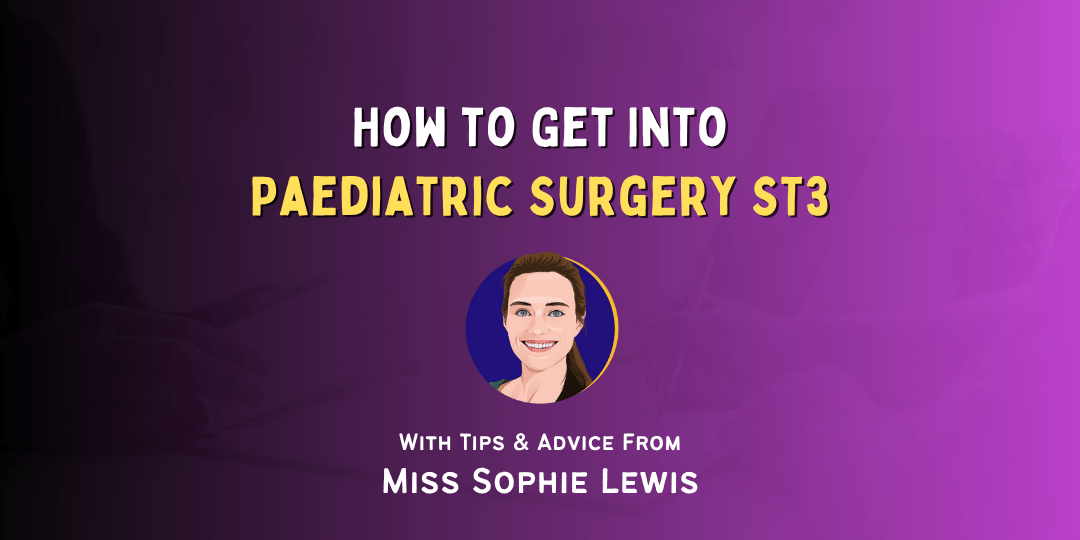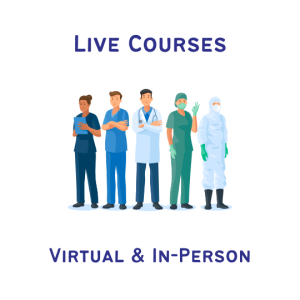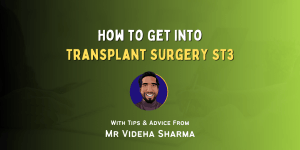
Published October 24, 2025 | Updated October 24, 2025
By MedCourse
Useful, relevant, and interesting content for UK Junior Doctors.
About the Author

Miss Sophie Lewis, ST5 Paediatric Surgery, North West Deanery
My interest in paediatric surgery stemmed from my experience in GOSH as a medical student. I was exposed to a diverse range of rare conditions and complex, delicate operations. I graduated from the University of Southampton in 2016 and returned to Wales for foundation training. I was unsuccessful in my first attempt at core surgical training. But the following year came back and secured my first-choice job within the Severn deanery.
Within my core surgical training, I spent a year in Bristol Royal Hospital for Children and fell in love with the specialty. I have since moved again to the Northwest for higher surgical training. I am currently one of three paediatric surgery representatives, which makes up TriPs. I have previously been on the ASiT exec and previously held the role of Vice President. I am passionate about education and have completed an MSc in medication education at Cardiff University. Alongside all these roles, I see myself as a reasonable baker and a holiday lover
Courses & Conferences to Attend
Conferences:
Courses
- Basic Surgical Skills
- Basic Surgical Skills in Paediatric Surgery (RCSEd)
- ATLS
- APLS
- CCrISP
- ASiT courses
- Doctors Academy MRCS course
APLS– The only course required for ST3 applications. Will need to book well in advance. Remember, it only lasts 4 years! No points for CST applications
Basic Surgical Skills in Paediatric Surgery RCSEd– Really good course and also not too expensive!
ASiT courses– great value! Look out for the paediatric surgery pre-conference course (the Friday before conference weekend-1st weekend in March)
How to Maximise Your Portfolio
Start early, as things always take longer than you think! Look at the core surgical training portfolio requirements, but also start to look at what is needed for ST3. It is all easily available online. Importantly, be portfolio savvy. Split your time across each domain as best as you can.
For example, I have had lots of teaching experience as well as my qualifications. At that point, I had maxed out those specific points, so now I needed to spend my energy somewhere else. There will be points you just won’t have, and try not to dwell on this.
For research, try to link yourself up with a consultant or registrar. Or join a collaborative project. The paediatric surgery research network (PSTRN) is a great organisation to help you get projects off the ground or allow you to contribute to collecting national data.
For Audits/QIPs, again speak with colleagues/seniors on what projects they are working on now. Try to pick one specifically in surgery, as this gives you the most points, and ideally, you want to complete the cycle to maximise those points further. If the project has some substance to it, submit it to a conference.
When submitting material to a conference, try to submit to the niche categories. For example, the ASiT conference will have 100s of Audit/QIP submissions but only a handful for paediatric surgery. But finally, don’t forget the portfolio only counts for 1/3 of your application for CST and only 1/10th for ST3.
It’s still important as you need to have enough points to get you to the interview. Once submitted, forget about it and really focus on the interview.
Treat it like an exam, learn some answers, and practice with as many different people as possible.
Making the Most of Your Day Job
Aim to secure a core surgical job within paediatric surgery. During the ST3 interviews, you can really distinguish those who have worked within the speciality and those who have had limited experience. However, be careful, too much experience can also be a negative on your application (>2years within paediatric surgery).
If you unfortunately do not get a paediatric surgery rotation, then consider taking time out and taking on a fellow job. The positive about paediatric surgery is that you do not get penalised for the number of years out following graduating medical school to apply for ST3, unlike other specialities.
Be aware that the application also favours those with general surgical experience, neonatal, and PICU, so consider rotations in these specialities, and they will really help you on the job as well once you are a registrar. In terms of procedures, appendix numbers are the ones you need to focus on and the ones that count for your application.
Try to get involved with projects, research, and teaching to hit those crucial points. When coming up to interviews, harass as many people as possible who are willing to help. Practice, practice, practice! Even if you are worried about making a mistake in front of others better to do it when practising than on the day.
Making the Most of Paediatric Surgery ST3 Placements
Enjoy it! There is so much variety within this speciality, and you will see so many interesting cases. Like within any speciality, really try to integrate yourself within the team. Be engaged and demonstrate your interest, and people will reciprocate this and assist you with your learning.
As an SHO in paediatric surgery, you will likely be the most junior person. It is very rare for the specialty to have foundation doctors. It is important to be able to recognise sick deteriorating patients, become confident in speaking with families and children, and get to grips with bloods/cannulas in small people. However, try to get to every clinical opportunity you can, including theatre and clinic.
During my core surgical training, the registrars would get allocations to theatre/clinic commitments. I therefore replicated this for the juniors. Making sure the wards were staffed safely, but also ensuring that training opportunities aren’t missed. You likely will have to take more initiative compared to other specialities to find the balance between training vs the wards.
What About Non-Paediatric Surgery ST3 Placements?
Admittedly, you may get to do more in other surgical specialties. Paediatric surgery is a very senior-led speciality. However, optimise these opportunities. If you have time on a general surgical placement or urology, try to get to grips with as many procedures as you can, as they are all transferable. If you are in urology, learn to carry out cystoscopy. If you are on a general surgery job, get used to laparoscopy and developing your basic surgical skills, and even endoscopy may be required.
Remember, jobs that expose you to working with children can be a beneficial learning experience. To work with children, you need to be adaptable, patient, and a good communicator. In addition, a lot of our job is not just supporting the patient but the family around them as well.













